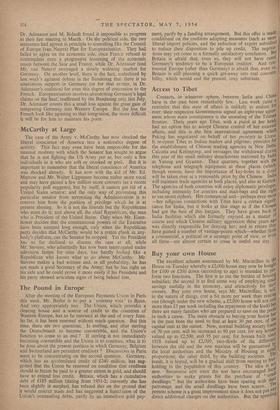Access to Tibet
Contacts, in 'whatever sphere, between India and China have in the past been remarkably few. Last week came a reminder that this state of affairs is unlikely to endure for ever, their respective Governments signed an eight-year agree' ment whose main consequence is the unsealing of the Tibetan frontier. Three years ago Tibet, with a pistol at her head, had no option but to accept Chinese control of her external affairs, and this is the first international agreement which Peking has negotiated on behalf of her protégés in Lhasa.. It re-opens Tibet to Indian traders and pilgrims; provides for the establishment of Chinese trading agencies in New Delhi' Calcutta and Kelimpong; and envisages the withdrawal daring this year of the small military detachments stationed by India at Yatung and Gyantse. Their quarters, together with the telephone and telegraph equipment at these places (which, though remote, have the importance of key-holes in a door) will be taken dyer at a reasonable price by the Chinese. India will maintain trade agencies at both places, and also at GartA The agencies of both countries will enjoy diplomatic privileges, including immunity for couriers and mail-bags and the right to use secret ciphers. Her commercial and—perhaps even more —her religious connections with Tibet have a certain signifi' cance for India, but it looks at this stage as if the Chinese had got the best of this bargain. They have given back to India facilities which she formerly enjoyed as a matter of course and which Chinese military aggression three years ag° was directly responsible for denying her; and in return they have gained a number of vantage-points which—whether frail a commercial, a political or a strategic point of view, or front all three—are almost certain to come in useful one day.










































 Previous page
Previous page